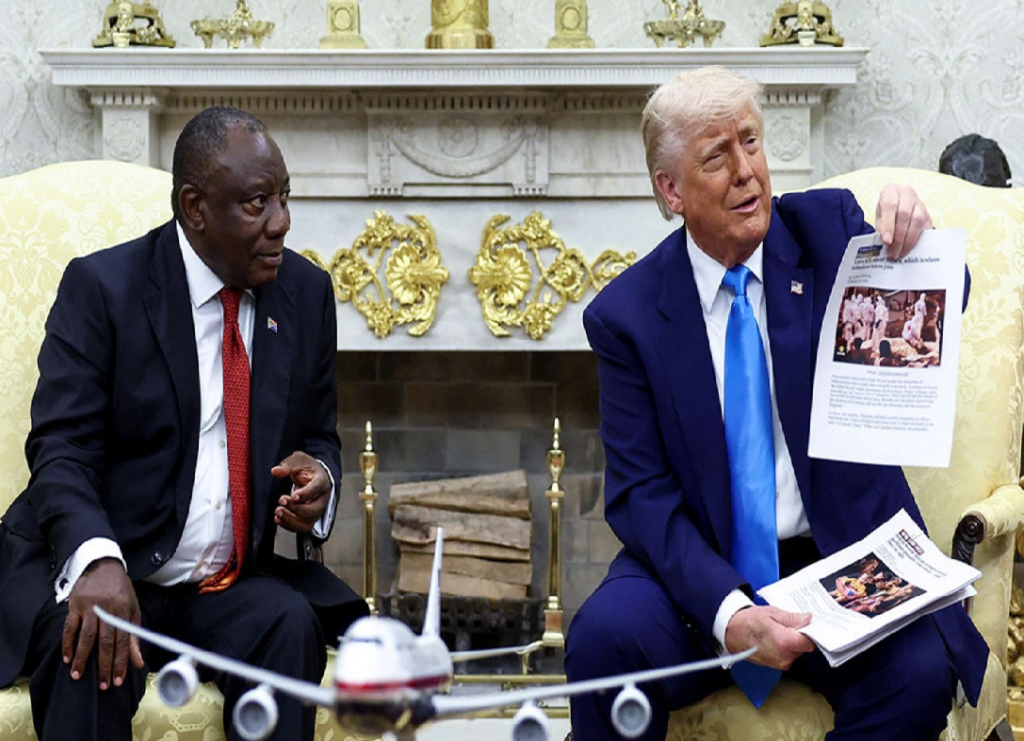
- The Trump administration alleged that South African authorities were systematically targeting whites, including claims of white genocide and the redistribution of white-owned farmland to black South Africans.
- One likely reason for Trump’s anger is South Africa’s recent move to involve the International Court of Justice over alleged Israeli war crimes in Gaza.
- South Africa’s key role in the Global South and BRICS, which challenges the U.S.-led world order, has created a natural rivalry, leading to differing views on global priorities, drawing Trump’s ire.
The South African President Cyril Ramaphosa visited the White House to meet with President Trump. This is the first such meeting since the return of President Trump to the White House in January of this year. However, this meeting comes at a very critical time, as things do not appear to be fine between South Africa and the United States of America. There have been continuous allegations coming from the Trump administration, including from President Trump himself, that President Ramaphosa’s administration is discriminatory against white South Africans. Following this, the relationship between the two countries has taken a new turn, which initiated President Cyril Ramaphosa’s visit to the United States of America.
What’s Causing the Differences
South Africa is a country with a significant white population, and many whites are involved in agriculture. These white agricultural farmers are called Boer farmers. The allegations by the Trump administration against the South African authorities are that there is a systematic genocide being carried out against whites in South Africa, and that white agricultural land has been encroached upon and redistributed by the South African administration to black South Africans. As a result, many white South Africans are left with no option but to leave the country. President Trump signed a specific executive order to fast-track the migration of these white South Africans to the United States of America.
The differences between the United States and South Africa were visible yesterday during President Ramaphosa’s visit, where there was a bit of a war of words. President Trump accused the Ramaphosa administration of exploiting white South Africans, to which President Ramaphosa responded by denying the claim. He said that if there had indeed been any genocide against whites in South Africa, then there would be no white population left in the country today. President Trump even stated that the South African President should relook into the matter, saying he is respected in some parts of the world but also criticised in others. President Ramaphosa responded that it is good for both South Africa and the United States of America to restart their relationship and to put aside their differences.
Now, the very question that arises from all of these developments is: Why is President Trump suddenly acting so cautious and vocal in advocating for whites in South Africa?
SA’s Diplomatic Strife Against Israel
One probable reason is a recent development in which South Africa approached the International Court of Justice regarding the alleged war crimes committed by Israel against Palestinians in Gaza. This has created a problem for Israel, as many countries, including Ireland, Spain, and Turkey, have shown a willingness to support South Africa’s initiative. Since it is well known that the United States and Israel are closely aligned, any criticism or diplomatic isolation of Israel in the international arena would naturally impact the United States as well. South Africa, which does not share good relations with Israel, may thus be viewed more critically by the U.S.
Another reason could be that South Africa is an important member of the Global South and an important member of BRICS. Since BRICS aims to provide competition to the American-led world order, this creates a natural rivalry between countries like South Africa and the United States of America. As a result, both countries are not necessarily on the same page when it comes to setting the global agenda.
Regardless of the specific reasons, one thing to understand is that no credible international evidence has been found of any genocide. While there may be some systematic exploitation happening, it remains on a minimal scale, and there is no credible international report suggesting that genocide has been committed against whites in South Africa. Hence, President Trump’s vocal concern about whites in South Africa is considered more as an attempt to interfere in South Africa’s domestic politics than a genuine humanitarian concern.
Aayush Pal is a freelance writer on contemporary geopolitical developments. The views expressed in his work are entirely his own.
